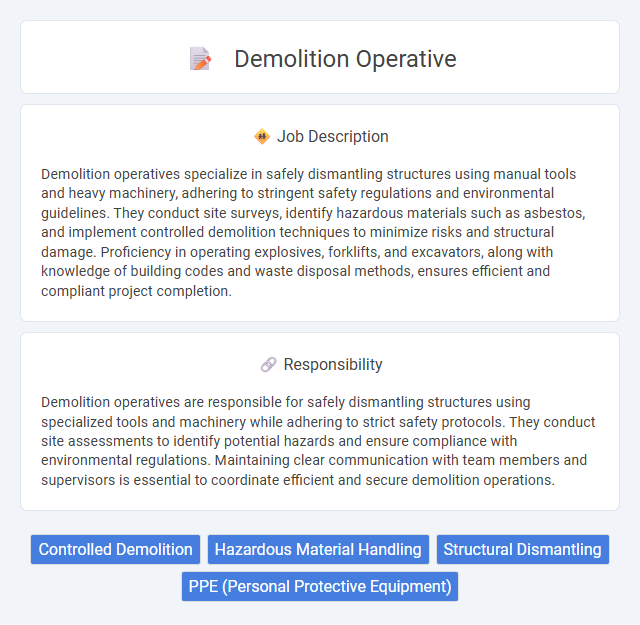
Demolition operatives specialize in safely dismantling structures using manual tools and heavy machinery, adhering to stringent safety regulations and environmental guidelines. They conduct site surveys, identify hazardous materials such as asbestos, and implement controlled demolition techniques to minimize risks and structural damage. Proficiency in operating explosives, forklifts, and excavators, along with knowledge of building codes and waste disposal methods, ensures efficient and compliant project completion.
Individuals with good physical fitness and a high tolerance for physically demanding and potentially hazardous environments are more likely to be suitable for a demolition operative job. Those who experience anxiety, claustrophobia, or have difficulty working under stressful or noisy conditions may find this role challenging and less compatible. Proper training and adherence to safety protocols could increase the probability of success and well-being in this occupation.
Qualification
A demolition operative must possess a valid CSCS card and hold relevant industry certifications such as the CITB Demolition Safety Awareness qualification. Essential qualifications include training in asbestos awareness, manual handling, and the safe use of plant machinery like excavators and breakers. Comprehensive knowledge of health and safety regulations, alongside practical experience in handling explosives and waste disposal, enhances job performance and compliance.
Responsibility
Demolition operatives are responsible for safely dismantling structures using specialized tools and machinery while adhering to strict safety protocols. They conduct site assessments to identify potential hazards and ensure compliance with environmental regulations. Maintaining clear communication with team members and supervisors is essential to coordinate efficient and secure demolition operations.
Benefit
Demolition operative jobs likely offer competitive wages due to the specialized skills required, along with potential overtime opportunities. Benefits may include comprehensive health insurance and safety training programs to ensure worker protection. Job stability could be probable in regions with ongoing construction and redevelopment projects.
Challenge
Demolition operative roles likely present significant challenges due to the high level of precision and safety required when handling explosives and heavy machinery. The job frequently demands rapid problem-solving skills to navigate complex structural environments and ensure controlled dismantling. Workers probably face unpredictable situations that test their ability to maintain strict safety protocols while operating under potentially hazardous conditions.
Career Advancement
Demolition operatives gain valuable experience in dismantling structures safely using specialized tools and explosives, which opens pathways to supervisory and project management roles. Mastery of safety regulations and heavy machinery enhances opportunities for advancement into site coordinator or health and safety officer positions. Continuous training and certification in hazardous materials handling and advanced demolition techniques are key drivers for career progression in this field.
Key Terms
Controlled Demolition
Controlled demolition operatives specialize in safely dismantling structures using precise techniques and explosives to minimize damage to surrounding areas. They conduct thorough risk assessments, prepare detailed demolition plans, and execute explosive charges to ensure buildings collapse in a predetermined manner. Expertise in local regulations, safety standards, and structural engineering is crucial for minimizing hazards and optimizing the demolition process.
Hazardous Material Handling
Demolition operatives specializing in hazardous material handling manage substances such as asbestos, lead, and chemical residues during site clearance, ensuring strict compliance with health and safety regulations like OSHA and HSE standards. They employ specialized equipment and protective gear to safely dismantle and dispose of toxic materials, minimizing environmental impact and preventing exposure-related illnesses. Expertise in risk assessment, containment procedures, and emergency response is critical to maintaining workplace safety and regulatory adherence.
Structural Dismantling
Demolition operatives specializing in structural dismantling expertly deconstruct buildings and infrastructure by systematically removing components to ensure safety and efficiency. They utilize advanced tools and techniques to carefully break down load-bearing elements while minimizing risks and debris. Expertise in interpreting structural blueprints and adhering to safety regulations is crucial for preventing collapse and facilitating site clearance.
PPE (Personal Protective Equipment)
Demolition operatives rely heavily on specialized Personal Protective Equipment (PPE) such as hard hats, high-visibility clothing, heavy-duty gloves, safety goggles, and steel-toed boots to mitigate risks from falling debris, dust, and hazardous materials. Respiratory protection including dust masks or respirators is essential to prevent inhalation of harmful particles during explosive or mechanical demolition processes. The careful selection and consistent use of PPE significantly reduce injury rates and enhance safety compliance on demolition sites.
 kuljobs.com
kuljobs.com